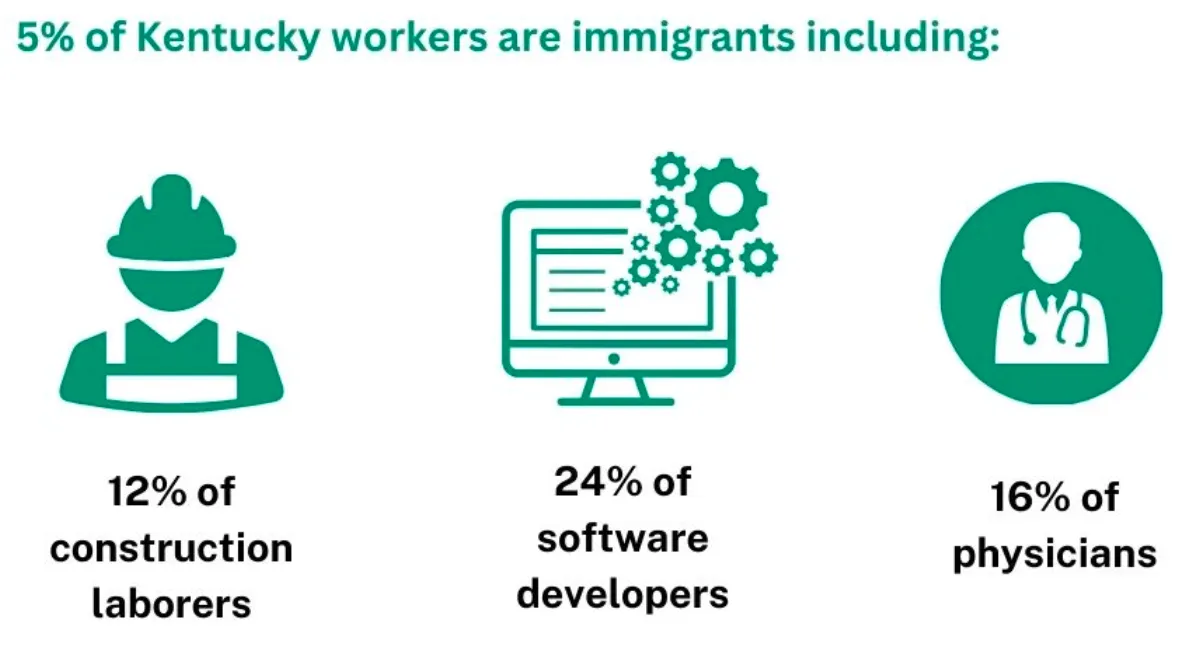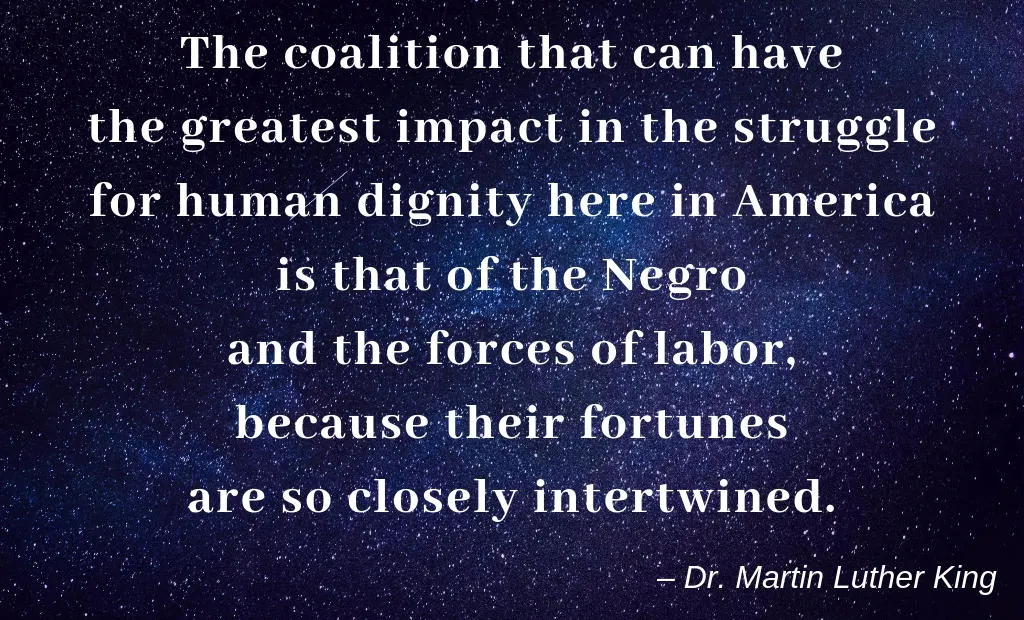Table of Contents
Nearly two years after the Supreme Court overturned the 1973 Roe v. Wade decision guaranteeing a national right to abortion, a majority of Americans continue to express support for abortion access.
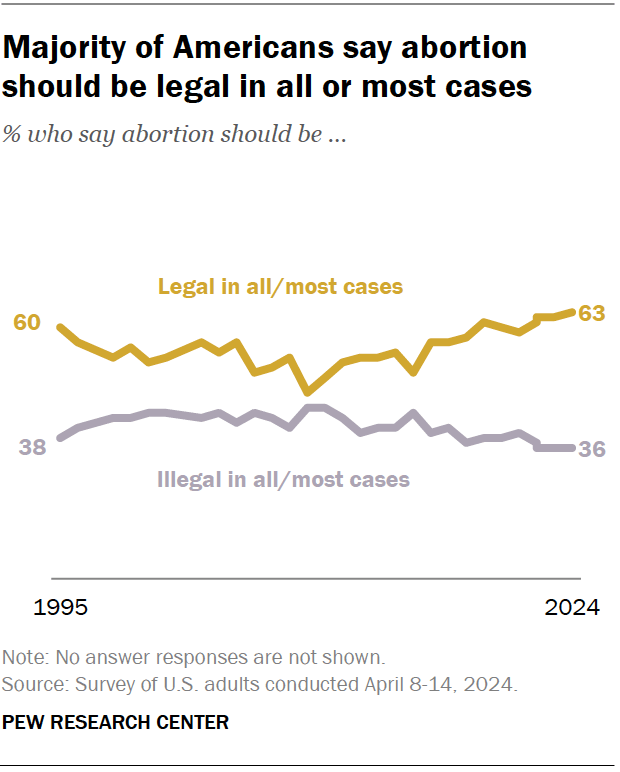
About six-in-ten (63%) say abortion should be legal in all or most cases. This share has grown 4 percentage points since 2021 – the year prior to the 2022 decision in Dobbs v. Jackson Women’s Health Organization that overturned Roe.
The new Pew Research Center survey, conducted April 8-14, 2024, among 8,709 adults, surfaces ongoing – and often partisan – divides over abortion attitudes:
- Democrats and Democratic-leaning independents (85%) overwhelmingly say abortion should be legal in all or most cases, with near unanimous support among liberal Democrats.
- By comparison, Republicans and Republican leaners (41%) are far less likely to say abortion should be legal in all or most cases. However, two-thirds of moderate and liberal Republicans still say it should be.
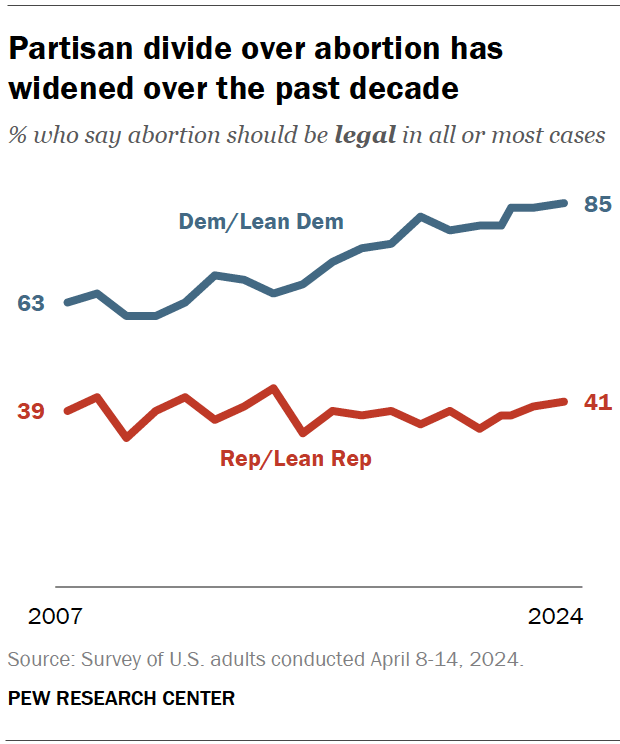
Since before Roe was overturned, both parties have seen a modest uptick in the share who say abortion should be legal.
As in the past, relatively few Americans (25%) say abortion should be legal in all cases, while even fewer (8%) say it should be illegal in all cases. About two-thirds of Americans do not take an absolutist view: 38% say it should be legal in most cases, and 28% say it should be illegal in most cases.
Other abortion attitudes
Women’s abortion decisions
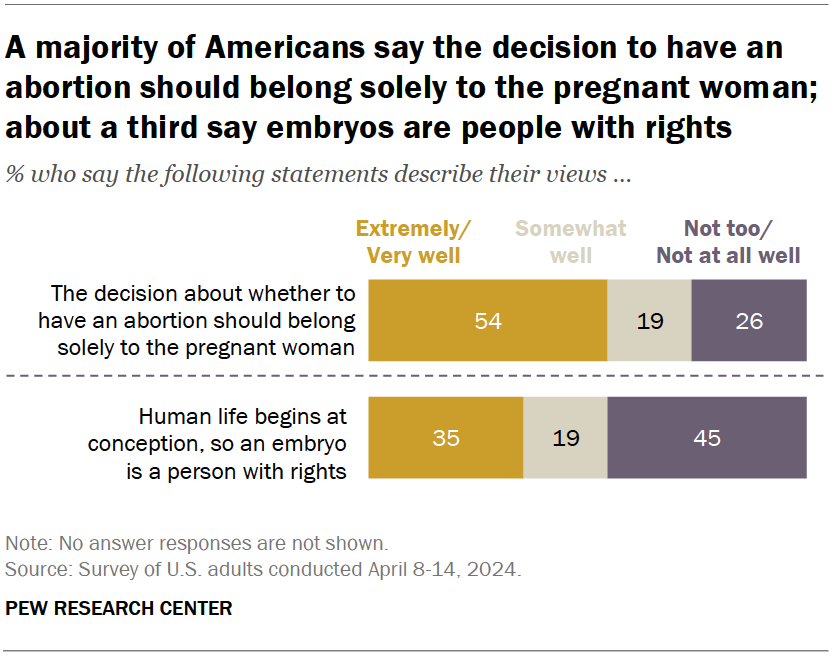
A narrow majority of Americans (54%) say the statement “the decision about whether to have an abortion should belong solely to the pregnant woman” describes their views extremely or very well. Another 19% say it describes their views somewhat well, and 26% say it does not describe their views well.
Views on an embryo’s rights
About a third of Americans (35%) say the statement “human life begins at conception, so an embryo is a person with rights” describes their views extremely or very well, while 45% say it does not describe their views well.
But many Americans are cross-pressured in their views: 32% of Americans say both statements about women’s decisions and embryos’ rights describe their views at least somewhat well.
Abortion access
About six-in-ten Americans in both parties say getting an abortion in the area where they live would be at least somewhat easy, compared with four-in-ten or fewer who say it would be difficult.
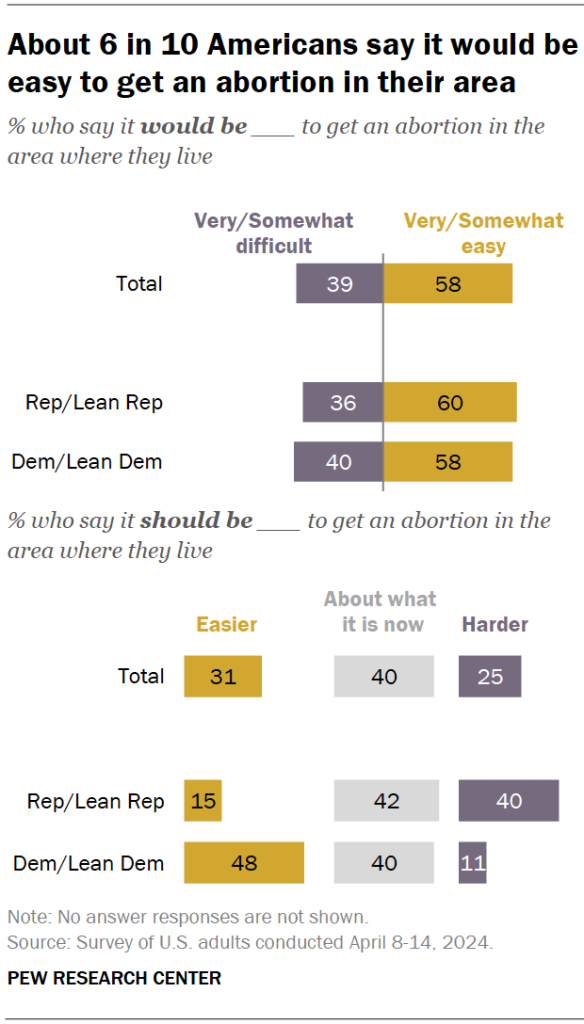
However, U.S. adults are divided over whether getting an abortion should be easier or harder:
- 31% say it should be easier for someone to get an abortion in their area, while 25% say it should be harder. Four-in-ten say the ease of access should be about what it is now.
- 48% of Democrats say that obtaining an abortion should be easier than it is now, while just 15% of Republicans say this. Instead, 40% of Republicans say it should be harder (just 11% of Democrats say this).
As was the case last year, views about abortion access vary widely between those who live in states where abortion is legal and those who live in states where it is not allowed.
For instance, 20% of adults in states where abortion is legal say it would be difficult to get an abortion where they live, but this share rises to 71% among adults in states where abortion is prohibited.
Medication abortion
Americans say medication abortion should be legal rather than illegal by a margin of more than two-to-one (54% vs. 20%). A quarter say they are not sure.
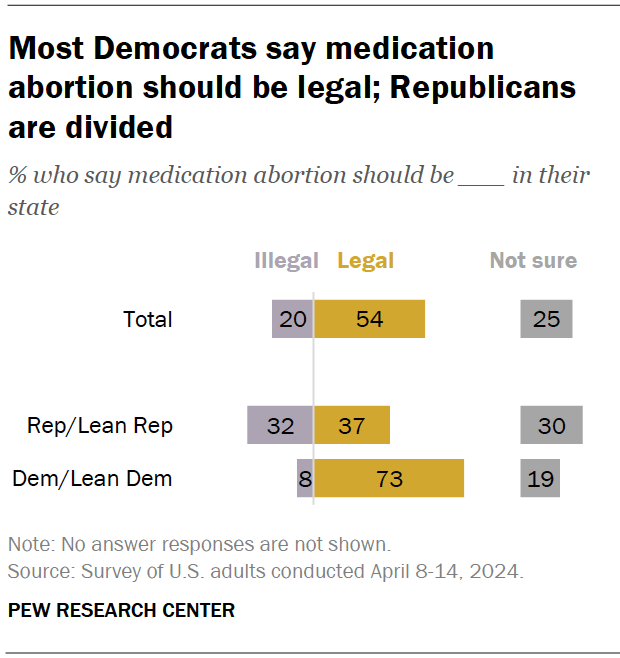
Like opinions on the legality of abortion overall, partisans differ greatly in their views of medication abortion:
- Republicans are closely split but are slightly more likely to say it should be legal (37%) than illegal (32%). Another 30% aren’t sure.
- Democrats (73%) overwhelmingly say medication abortion should be legal. Just 8% say it should be illegal, while 19% are not sure.
Across most other demographic groups, Americans are generally more supportive than not of medication abortion.
Overall attitudes about abortion
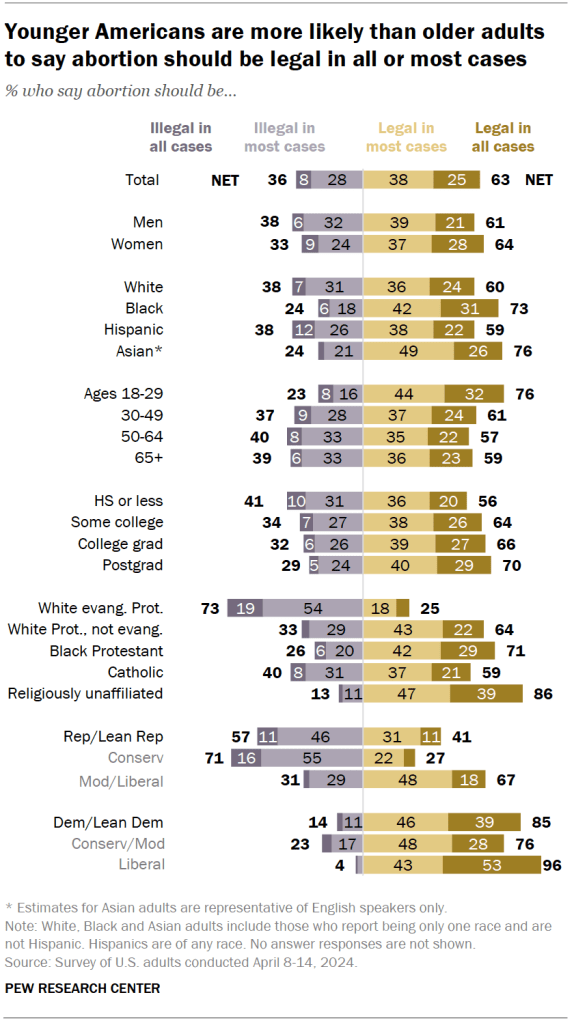
Across demographic groups, support for abortion access has changed little since this time last year.
Today, roughly six-in-ten (63%) say abortion should be legal in all (25%) or most (38%) cases. And 36% say it should be illegal in all (8%) or most (28%) cases.
While differences are only modest by gender, other groups vary more widely in their views.
Race and ethnicity
Support for legal abortion is higher among Black (73%) and Asian (76%) adults compared with White (60%) and Hispanic (59%) adults.
Age
Compared with older Americans, adults under 30 are particularly likely to say abortion should be legal: 76% say this, versus about six-in-ten among other age groups.
Education
Those with higher levels of formal education express greater support for legal abortion than those with lower levels of educational attainment.
About two-thirds of Americans with a bachelor’s degree or more education (68%) say abortion should be legal in all or most cases, compared with six-in-ten among those without a degree.
Religion
White evangelical Protestants are about three times as likely to say abortion should be illegal (73%) as they are to say it should be legal (25%).
By contrast, majorities of White nonevangelical Protestants (64%), Black Protestants (71%) and Catholics (59%) say abortion should be legal. And religiously unaffiliated Americans are especially likely to say abortion should be legal (86% say this).
Partisanship and ideology
Democrats (85%) are about twice as likely as Republicans (41%) to say abortion should be legal in all or most cases.
But while more conservative Republicans say abortion should be illegal (76%) than legal (27%), the reverse is true for moderate and liberal Republicans (67% say legal, 31% say illegal).
By comparison, a clear majority of conservative and moderate Democrats (76%) say abortion should be legal, with liberal Democrats (96%) overwhelmingly saying this.
Views of abortion access by state
About six-in-ten Americans (58%) say it would be easy for someone to get an abortion in the area where they live, while 39% say it would be difficult.
This marks a slight shift since last year, when 54% said obtaining an abortion would be easy. But Americans are still less likely than before the Dobbs decision to say obtaining an abortion would be easy.
Still, Americans’ views vary widely depending on whether they live in a state that has banned or restricted abortion.
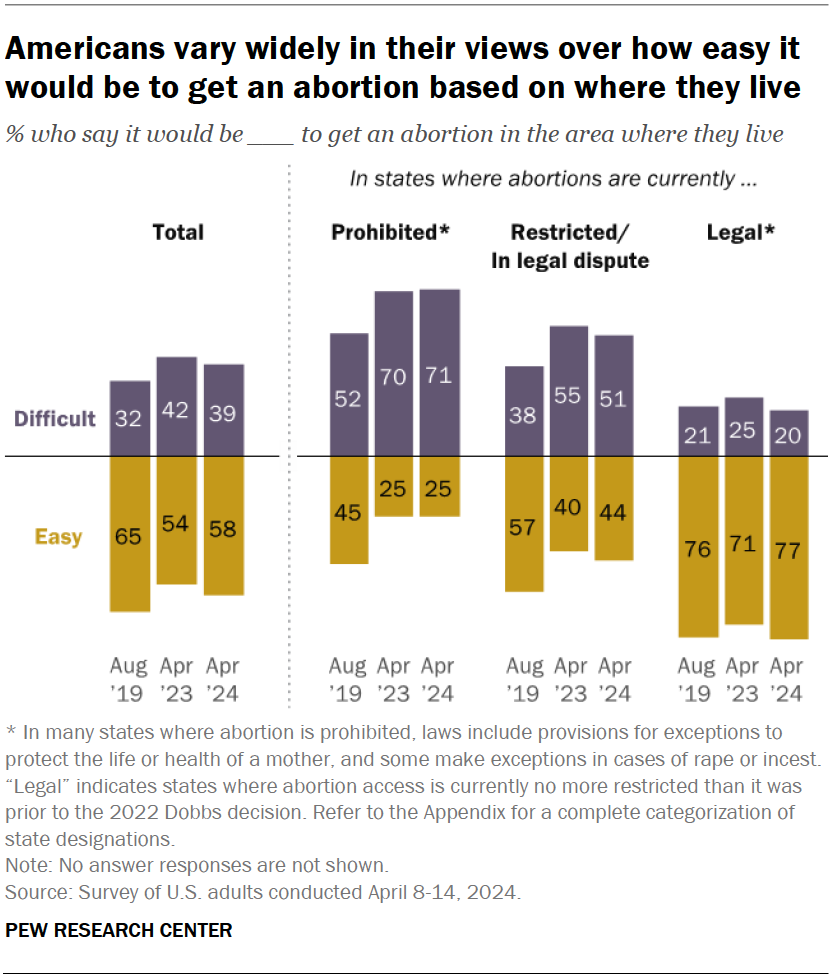
In states that prohibit abortion, Americans are about three times as likely to say it would be difficult to obtain an abortion where they live as they are to say it would be easy (71% vs. 25%). The share saying it would be difficult has risen 19 points since 2019.
In states where abortion is restricted or subject to legal challenges, 51% say it would be difficult to get an abortion where they live. This is similar to the share who said so last year (55%), but higher than the share who said this before the Dobbs decision (38%).
By comparison, just 20% of adults in states where abortion is legal say it would be difficult to get one. This is little changed over the past five years.
Americans’ attitudes about whether it should be easier or harder to get an abortion in the area where they live also varies by geography.
Overall, a decreasing share of Americans say it should be harder to obtain an abortion: 33% said this in 2019, compared with 25% today.
This is particularly true of those in states where abortion is now prohibited or restricted.
In both types of states, the shares of Americans saying it should be easier to obtain an abortion have risen 12 points since before Roe was overturned, as the shares saying it should be harder have gradually declined.
By comparison, changes in views among those living in states where abortion is legal have been more modest.
Americans’ views on medication abortion in their states
While Americans overall are more supportive than not of medication abortion (54% say it should be legal, 20% say illegal), there are modest differences in support across groups:
- Younger Americans are somewhat more likely to say medication abortion should be legal than older Americans. While 59% of adults ages 18 to 49 say it should be legal, 48% of those 50 and older say the same.
- Asian adults (66%) are particularly likely to say medication abortion should be legal compared with White (55%), Black (51%) and Hispanic (47%) adults.
- White evangelical Protestants oppose medication abortion by about two-to-one (45% vs. 23%), with White nonevangelicals, Black Protestants, Catholics and religiously unaffiliated adults all being more likely than not to say medication abortion should be legal.
- Republicans are closely divided over medication abortion: 37% say it should be legal while 32% say it should be illegal. But similar to views on abortion access overall, conservative Republicans are more opposed (43% illegal, 27% legal), while moderate and liberals are more supportive (55% legal, 14% illegal).
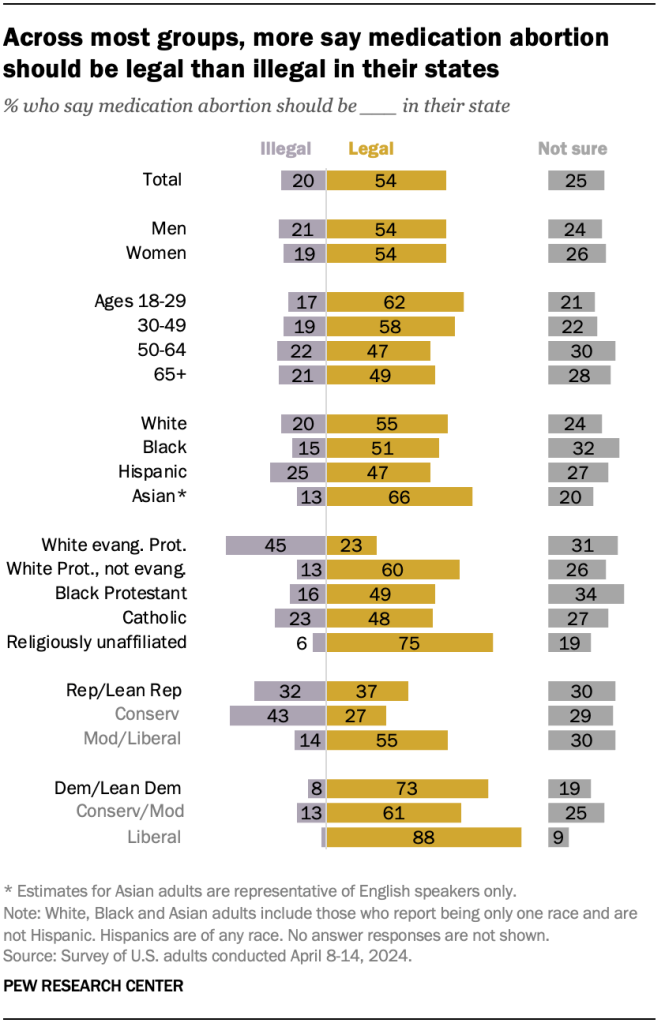
How statements about abortion resonate with Americans
Just over half of Americans (54%) say “the decision about whether to have an abortion should belong solely to the pregnant woman” describes their views extremely or very well, compared with 19% who say somewhat well and 26% who say not too or not at all well.
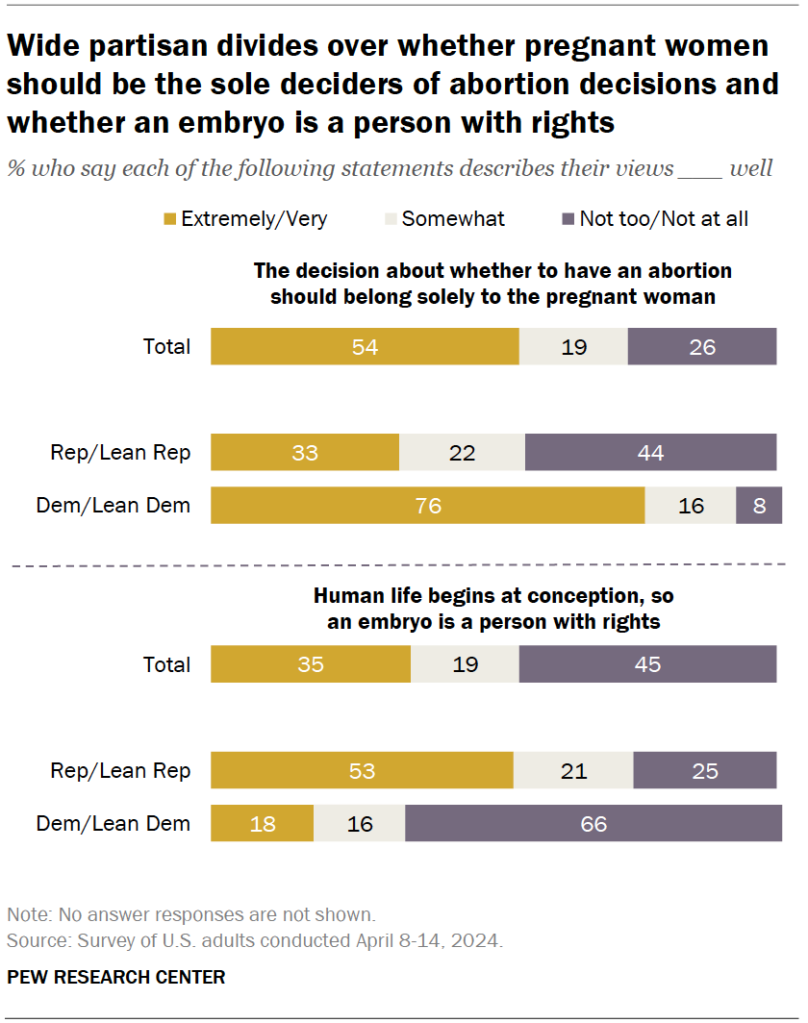
Democrats (76%) overwhelmingly say this statement describes their views extremely or very well, with just 8% saying it does not describe their views well.
Republicans are more divided: 44% say it does not describe their views well while 33% say it describes them extremely or very well. Another 22% say it describes them somewhat well.
Fewer Americans (35%) say the statement “human life begins at conception, so an embryo is a person with rights” describes their views extremely or very well. Another 19% say it describes their views somewhat well while 45% say it describes them not too or not at all well.
(The survey asks separately whether “a fetus is a person with rights.” The results are roughly similar: 37% say that statement describes their views extremely or very well.)
Republicans are about three times as likely as Democrats to say “an embryo is a person with rights” describes their views extremely or very well (53% vs. 18%). In turn, Democrats (66%) are far more likely than Republicans (25%) to say it describes their views not too or not at all well.
Some Americans are cross-pressured about abortion
When results on the two statements are combined, 41% of Americans say the statement about a pregnant woman’s right to choose describes their views at least somewhat well, but not the statement about an embryo being a person with rights. About two-in-ten (21%) say the reverse.
But for nearly a third of U.S. adults (32%), both statements describe their views at least somewhat well.
Just 4% of Americans say neither statement describes their views well.
--30--
Cross-posted from the Pew Research Center.





